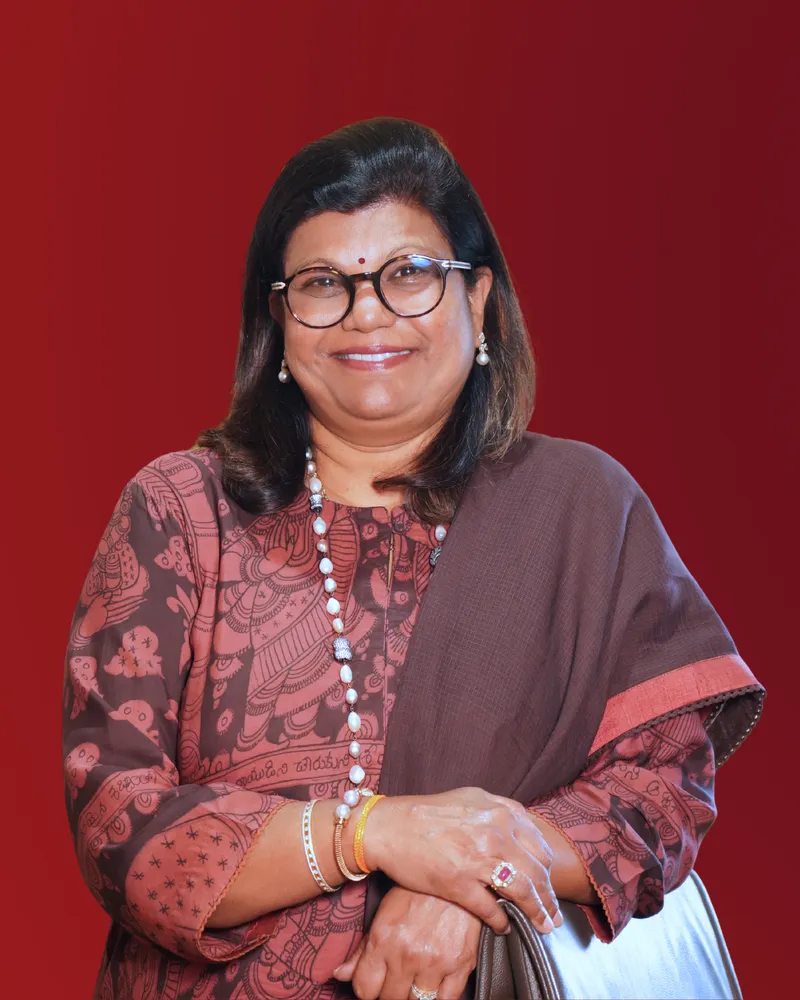Vaccine lady Suchitra Ella on transporting COVID-19 virus strain from NIV lab to Bharat Biotech to develop India’s first homegrown vaccine
At HerStory’s Women on a Mission Summit, Suchitra Ella, Co-founder and Joint Managing Director of Bharat Biotech, recounts the race against time to develop COVAXIN, India’s homegrown COVID-19 vaccine.
The COVID-19 pandemic showed the world some of the most disturbing visuals and narratives of death, despair, and loss.
However, as the world started easing into the new normal, stories of resilience and renewal also scripted a new story of hope. Powering this story of rebuilding humanity are vaccines, waging a war against the deadly virus.

Suchitra Ella
HerStory’s Women on a Mission Summit, held on March 11-12, hosted Suchitra Ella, co-founder and Joint Managing Director of , which she started with her husband Dr Krishna Ella in 1996. As the company rolled out India’s first homegrown vaccine, COVAXIN, Suchitra has been one of the leading voices of India’s vaccine mission.
Over the years, Bharat Biotech has delivered vaccines globally for hepatitis B, influenza H1N1, rotavirus, Japanese encephalitis, rabies, chikungunya, zika, and the world's first tetanus-toxoid conjugated vaccine for typhoid.
The ‘vaccine lady’ of India, in an exclusive fireside chat, recounted a goosebumps-inducing account of how the COVID-19 strain travelled from the Institute of Virology lab in Pune to Bharat Biotech’s facility in Genome Valley, Hyderabad.
When the pandemic struck, Suchitra said, confusion reigned.
“The academic world, the scientific world, the biotech, life sciences sector, policy makers, the government, and of course the public at large were confused. The horrible side effects of the COVID-19 virus were just unravelling in the Western world at that time,” she says.
In March-April 2020, the preparedness towards the vaccine in India, in terms of recombinant technologies, did not exist.
“We had to simply jump onto the bandwagon of a time-tested vaccine development process, the classic method of developing vaccines that’s more than 70-years-old,” she explains.
Suchitra explained the process in simple terms.
“The potential vaccine we were hoping to make would have to be on par with the polio vaccine in the way it was developed. It’s a safe vaccine because it has been deployed in public health across the world for decades. We felt comfortable to try out this way rather than reinvent the wheel by looking at recombinant technologies or other platforms at that point because we didn’t have the time.”
“We had no time to start research in a new direction, and because of our prior expertise we understood that in order to develop a good and safe vaccine, the raw material we needed was nothing other the source code to the virus itself,” she added.
As a private biotech company, Bharat Biotech did not have access to it. They wrote to the Indian Council of Medical Research (ICMR), and requested them to provide samples of the SARS COV 2 virus antigen that was at the time, isolated at the National Institute of Virology, Pune that does extensive research in the field of virology.
Transporting a deadly virus
The NIV accepted the request, but the journey to transport the virus from Pune to Hyderabad was one fraught with many challenges.
The country was under lockdown, there were no flights and the only way to transport the material was by road. It was imperative that they did not risk this kind of material by a third-party driver or a logistics service provider.
“Our own team came forward, and they travelled in a couple of vehicles. We needed permission to cross state borders of Telangana, Karnataka, and Maharashtra to enter Pune. We got all that lined up, and our team set off with food, water, coffee, and tea packed in their cars,” she said.
After reaching Pune, the team stayed overnight, collected the samples along with the relevant information in terms of handling it at the right temperature and precautions.
“The beauty of it is that our own team volunteer to collect the sample, risking their safety and lives in terms of travelling and other issues. They successfully brought it to Hyderabad in a span of two days. We had to ensure that this virus material had to be taken into the facility immediately, which was ready in terms of receiving an highly infectious and contagious facilities – a bio-safely level 3 plus facility that was already in place for manufacturing the injectable polio vaccine.”
Suchitra said they have been fortunate to have pieces of a puzzle fall into place.
In about a month's time, the company had about 40 to 50 of bioprocess teams in the facility, round the clock, with some of them not going home for at least three months. Some of them were housed very close to the campus so that could come to the campus whenever there was any manufacturing emergency or exigency.
And the rest, as they say, is history. The race against time had yielded results. COVAXIN®, India's indigenous COVID-19 vaccine by Bharat Biotech, developed in collaboration with the ICMR - National Institute of Virology (NIV) was launched in 2021 and became part of India’s vaccination drive, the largest in the world.
(Additional research by Sanhati Banerjee)
Edited by Megha Reddy







